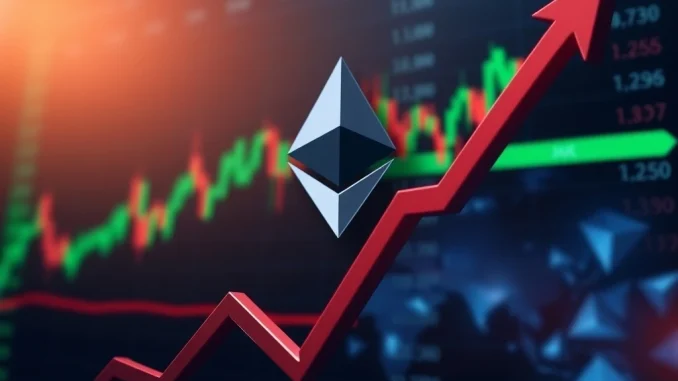
In the fast-paced world of digital assets, even small shifts can create significant ripples across traditional markets. Recently, the crypto community witnessed a compelling surge in the stock prices of companies actively embracing Ethereum (ETH) accumulation strategies. This isn’t just a fleeting moment; it’s a clear indicator of how deeply intertwined the fates of blockchain technology and conventional finance are becoming. For investors and enthusiasts alike, understanding these movements is crucial to navigating the evolving landscape.
Ethereum’s Ripple Effect on Public Markets
The morning buzz in U.S. pre-market trading saw a notable uplift for firms with direct exposure to Ethereum. These aren’t just tech companies dabbling in crypto; many are strategically building significant reserves of ETH, betting on its long-term value and utility. This strategy effectively links their corporate valuation to the performance of the underlying digital asset. When Ethereum shows strength, these companies often follow suit, creating a unique synergy between the decentralized crypto world and centralized stock exchanges.
This phenomenon highlights a growing trend: the increasing institutional adoption of cryptocurrencies. As more publicly traded companies integrate digital assets into their balance sheets or business models, their stock performance becomes increasingly sensitive to crypto market movements. It’s a clear sign that crypto, especially a foundational blockchain like Ethereum, is no longer just a niche interest but a significant financial asset influencing broader market dynamics.
Unpacking ETH Accumulation Strategies
Why are companies choosing to accumulate ETH? The reasons are multifaceted. Beyond simply holding it as a treasury asset, many firms are leveraging Ethereum’s robust ecosystem for decentralized applications (dApps), NFTs, and decentralized finance (DeFi). Accumulating ETH can be seen as an investment in the future of the internet, where Ethereum plays a pivotal role. These companies believe in the network’s scalability, security, and the continuous innovation it fosters.
The recent pre-market gains illustrate the market’s positive response to these strategies. Let’s look at some of the key players and their impressive jumps:
- GameSquare Holdings (GAME): Rose 3.95%
- BTCS: Gained 8.22%
- Bitmine Immersion Technologies (BMNR): Increased 4.6%
- SharpLink Gaming (SBET): Surged 9.04%
- Bit Digital (BTBT): Rose 3.13%
These gains are not coincidental. They reflect investor confidence in the long-term prospects of Ethereum and the foresight of these companies in positioning themselves to benefit from its growth. It’s a powerful statement about the market’s evolving perception of digital assets as legitimate and valuable components of corporate portfolios.
Why Are Crypto Stocks Surging in Pre-market Trading?
The pre-market trading session often acts as an early indicator of market sentiment. It’s where institutional investors and early birds place their bets before the main bell rings. A surge during this period, particularly for crypto stocks, can be attributed to several factors:
- Positive Ethereum Sentiment: Strong performance or positive news surrounding Ethereum itself often translates directly into gains for companies holding ETH. This could be due to network upgrades, increased transaction volume, or growing developer activity.
- Anticipation of Broader Market Trends: Traders might be front-running anticipated bullish trends in the broader cryptocurrency market, using pre-market activity to position themselves.
- Company-Specific News: While the overarching theme is Ethereum, some of these companies might also have had their own positive news, such as new partnerships, successful mining operations, or favorable financial reports, amplifying the ETH-driven gains.
- Increased Institutional Interest: More traditional financial institutions are entering the crypto space, leading to increased demand for publicly traded companies with direct crypto exposure.
This pre-market activity sets the tone for the trading day, signaling robust interest and potential for continued upward momentum. It underscores the growing influence of digital asset performance on traditional equity markets.
The Rise of Digital Asset Companies
The companies mentioned—GameSquare Holdings, BTCS, Bitmine Immersion Technologies, SharpLink Gaming, and Bit Digital—represent a diverse set of digital asset companies. While some are directly involved in crypto mining or infrastructure, others are integrating crypto into their existing business models, such as gaming or financial services. This diversity showcases the broad applicability and increasing relevance of blockchain technology across various industries.
What are the benefits for these companies?
- Diversification: Adding digital assets like ETH can diversify their treasury holdings beyond traditional fiat and commodities.
- Future-Proofing: Positioning themselves at the forefront of a rapidly evolving technological and financial paradigm.
- Investor Appeal: Attracting a new segment of investors who are keen on exposure to the crypto market through regulated stock exchanges.
- Operational Efficiency: Leveraging blockchain for improved transparency, security, and efficiency in their core operations.
However, it’s also important to acknowledge the inherent volatility of the crypto market. While gains can be explosive, downturns can also be sharp. Companies adopting these strategies must navigate market fluctuations, regulatory uncertainties, and technological advancements carefully. Their success often hinges on a deep understanding of both traditional finance and the intricacies of the blockchain ecosystem.
What Does This Mean for Investors?
For investors, the surge in Ethereum-related stocks offers both opportunities and considerations:
- Direct Exposure to Crypto: Investing in these stocks provides a way to gain exposure to the crypto market without directly buying and holding cryptocurrencies, which might be preferable for some due to regulatory or custody concerns.
- Due Diligence is Key: It’s crucial to research individual companies. Understand their specific business model, their level of ETH exposure, and their overall financial health, not just their pre-market gains.
- Market Volatility: Remember that these stocks are often highly correlated with the underlying crypto asset. If Ethereum faces a downturn, these stocks are likely to follow.
- Long-Term vs. Short-Term: Consider your investment horizon. Are you looking for short-term trading opportunities based on crypto news, or are you investing in the long-term growth of companies building on blockchain technology?
The performance of these stocks serves as a barometer for the broader sentiment towards Ethereum and the digital asset space. It signals a growing confidence in the utility and value proposition of blockchain technology extending beyond just speculative trading.
Conclusion
The recent pre-market surge in stocks of companies implementing Ethereum accumulation strategies is a compelling testament to the increasing integration of digital assets into mainstream finance. From GameSquare Holdings to Bit Digital, these firms are not just riding the crypto wave; they are actively shaping the future of finance by embracing blockchain technology. This trend underscores Ethereum’s foundational role in the digital economy and highlights the burgeoning opportunities for investors willing to explore the intersection of traditional markets and the innovative world of cryptocurrencies. As the digital asset landscape continues to mature, expect to see even more pronounced connections between crypto performance and the equity markets, making a nuanced understanding of both essential for informed decision-making.
Frequently Asked Questions (FAQs)
Q1: What does ‘Ethereum accumulation strategies’ mean for these companies?
A1: ‘Ethereum accumulation strategies’ refers to companies actively acquiring and holding significant amounts of Ethereum (ETH) as part of their corporate treasury or for use in their business operations. This can be for investment purposes, to power their blockchain-based products/services, or to diversify their assets.
Q2: Why do these specific companies (GameSquare, BTCS, etc.) see gains when Ethereum performs well?
A2: These companies often have business models directly tied to the crypto ecosystem (e.g., mining, digital asset management, blockchain tech) or have publicly announced holding ETH on their balance sheets. When Ethereum’s value increases, it positively impacts their asset valuation, revenue streams, or investor sentiment, leading to stock price appreciation.
Q3: Is investing in crypto stocks the same as investing directly in Ethereum?
A3: No, it’s not the same. Investing in crypto stocks provides indirect exposure to Ethereum’s performance through a publicly traded company. While correlated, company-specific factors (management, profitability, debt, regulatory issues) also influence stock prices, which are not relevant when directly buying ETH.
Q4: What is pre-market trading and why is it significant for these stocks?
A4: Pre-market trading occurs before the regular stock market hours. It’s significant because it allows institutional investors and high-volume traders to react to overnight news or trends (like crypto market movements) before the general public, often setting the tone for the day’s trading and indicating early sentiment.
Q5: What are the risks associated with investing in digital asset companies?
A5: Risks include high volatility due to cryptocurrency price fluctuations, regulatory uncertainties in the crypto space, technological risks, and general market risks applicable to all stocks. Their performance is highly dependent on the health and trends of the broader digital asset market.
Q6: How can investors stay informed about the performance of Ethereum-related stocks?
A6: Investors can stay informed by following financial news outlets, checking stock market data for the mentioned companies, monitoring cryptocurrency market trends for Ethereum, and reviewing company earnings reports and public announcements regarding their digital asset strategies.



